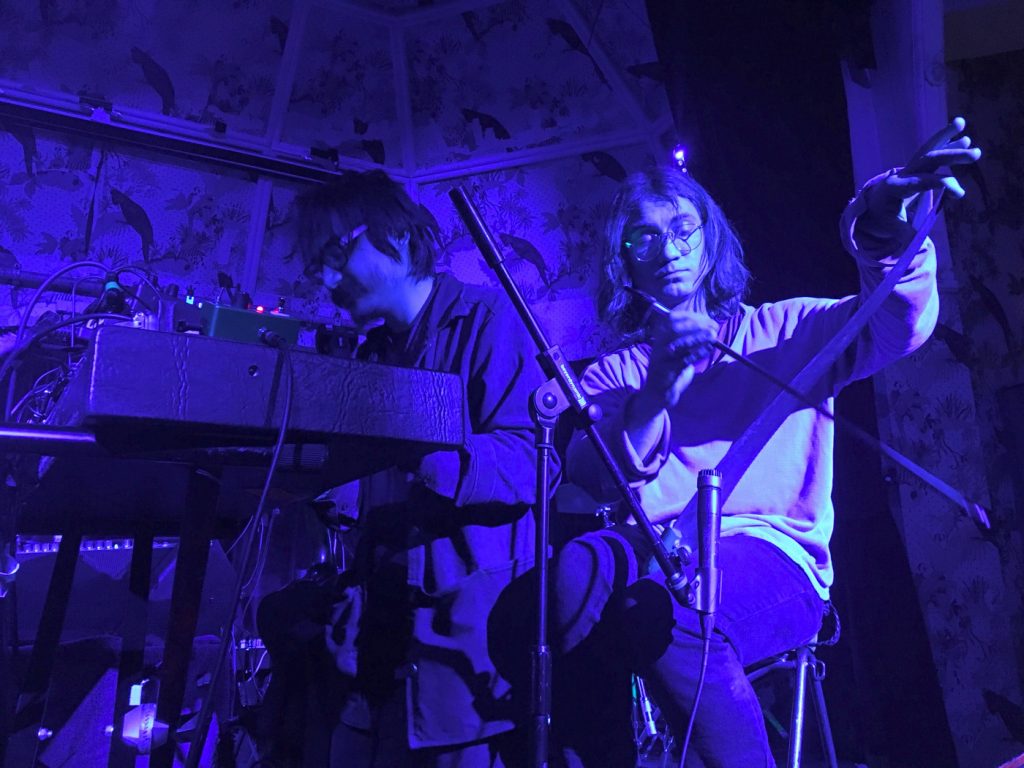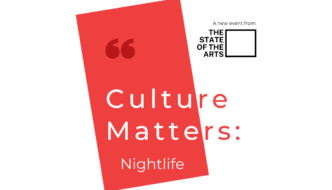
Photo: In Hous Press
The Low Anthem have returned to the UK to tour their ethereal fifth studio album The Salt Doll Went to Measure the Depth of the Sea. Having had their Eyeland tour cruelly cut short after a car crash that left Jeff Prystowsky in hospital and much of their equipment in tatters, the band’s latest offering is both elegiac and beautiful. The album is inspired by a Buddhist fable about a Salt Doll who wants to understand the sea. With every encounter it learns a little more but gradually dissolves until it loses itself to the waves.
I caught up with Jeff, Ben and Florence on their Manchester date to talk about the new album, hecklers and a piano playing cat.
Welcome back to the UK. Having been to many of your shows, it seems like you have a devoted and supportive following over here. Is that something you’re aware of, and are there places you look forward to playing?
J: It’s definitely special. I feel a lot of gratitude. There are a lot of musicians in Providence where we live, but not many of them get to come over and play. I’m thankful that the music resonates over here.
B: I feel lucky that we can still come over here and people come to shows, because for five years we didn’t tour. And now we’ve come back over with all new music and people are interested.
I guess your last two albums are considerably different from your first three – the ones that helped you make a name for yourself. Do you get the sense that people are still hankering after the old stuff, or are they receptive to the new material?
B: I have to give a lot of credit to the people who are coming to the shows because we’re playing the album from start to finish. People are in it, they like to follow the story. Although we did have one drunk heckler in Scotland…
F: We always have one drunk heckler in Scotland. There’s always one.
B: He was like, “You’re pigs! You’re pigs for doing this!” (They all laugh)
F: The rest of the crowd were very sweet and defended us though
Speaking of hecklers, I’ve noticed that at many of your shows there’s a guy that shouts “What a fucking band!” at some point in the set. Do you pay him?
(They chuckle)
B: I met him once after a show, he’s usually in London, that guy, and he was a nice enough gentleman. He wasn’t interested in talking to me. He just wanted me to know that it was him yelling all those times. It was in a sea of people and then he was gone. It was so weird.
Now I didn’t know whether or not to break the news, but I’ve heard of the same man turning up at a Barr Brothers gig recently at the Union Chapel in London…
B: That guy… They were also the first band that ever took us on tour, not under the name Barr Brothers but one of their older bands called The Slip.
What was that like?
B: It was great. They were so dear. They’ve been doing it so long that they relate to music as craftsmen with all of their heart. They’re the kindest people to travel with.
J: Brad told me: “Always believe in the magic of the music”, and I’ve never forgot that.
That’s a very nice mantra to go by, especially as a musician. Regarding the new album, the process seems to have been different than normal for you guys, for obvious reasons after your car crash last tour. What was it like to join Ben half-way through the creative process?
F: Ben’s always doing a million projects. Before I joined, Ben was making The Moth Machine — he’s an inventor, sometimes you just wander into things he’s doing.
B: Before we left for tour, I set up my room as a Rube Goldberg machine that was making continual sounds. We’d been recording Xylouris White in our studio, and Jeff was the main person doing the engineering. In the in-between moments I was running down the hall and would hang the wind chimes by an open window, and run back down and record them. And I’ve been teaching my cat to play piano for a long time.
Really? And how is that going?
B: It’s going great, except the cat the is staying with some friends while we are away…
She’s not going to practice!
B: Yeah she’s going to be rusty. It’s disappointing, two steps forward, one step back. Anyway, after we got back after the accident, my whole whole room was still full of the junk, wires and little pocket synths plugged into each other, and so I came back and just pressed the button on my turntable and everything I had been messing around with was right there, that sound in the room.
Is that where you got the idea to make the beats using the inner groove on vinyl records? I read about you using a needle and sandpaper — what was it you actually did with those things?
B: Well, you have to have a record player without an auto return. I worked out that the length of time held within the inner circle of the record is a little less than a two-second loop, and my turntable had a variable speed within a ten beats per minute in either direction. So I could go up to around 55bpm, and down to around 23bpm, about. This meant that I had quite a narrow tempo range, so it gave a mantric quality to the beats. But what I would do was take a piece of acetate that had divisions of four, eight, and sixteen labelled on it, and then another one for time signatures, and I would just lay that on the label of the record and you could see where the beats would fall. Then I would take a fine pin, and make an indent where the beats were, and try to imagine it in my head. Some of the indents would be deeper to give a deeper sound.
That’s fascinating purely on a procedural note.
B: The thing that I think about the process that is different than using a drum machine, and I can’t prove this, but I feel like each time the record goes round it creates a slightly different sound through the chaos of the needle bouncing over the indents. It’s almost identical, but it’s not an exact replica. This made me notice that my ear didn’t get fatigued by it. I could just spend all day making a song, and I’d go out and come back and tweak it a little bit, smoke a spliff, read a book, leave it playing, and then I’d start to have an idea and would pick up the guitar. It was this process where the music was always in the air, so you didn’t have to do the lifting, you didn’t have to keep strumming for the music to continue onwards — you could just be in the environment of the music.
Does that mean you have 12 very bargain bin records that are actually very special?
B: There’s actually many more than that because I destroyed loads in the process. There’s probably like 16 records or something, but double sided of course.
J: The way you described the process felt, to me, almost like a living painting. It’s not like a normal painting where you simply put a layer on, because that layer wouldn’t change. But imagine that layer slowly changing colours, doing its own painting, and you go back to it and also adapt and use these changes.
Do you see yourselves continuing to make this soundscape-y type of music in the future? Are you going to come back to the folkier side to music that you had been doing previously?
B: Well we both have some sounds in the works, and Florence has too, and I guess they all have a mantric quality. Jeff has just written a suite of piano songs for all of the planets. I also saw the potential from the needle skipping while making this record, and so want to explore that a little bit more. I’ve been building a record player that has three platters that all run together so I can use that concept but run three different sounds in time. It has a patch bay where all the sounds come out, but there are also these magnets that keep time as they go round, embedded into the platters. Which you could theoretically connect to any analogue synthesisers that took a control voltage. So it also could become a bridge to have this thing keep time for a network of synthesised analogue electronic sounds.
Do you see that sort of DIY instrumental experimentation as essential to your process of making music?
F: I think that relates to the general feeling of trying to discover sound on your own pathway, taking the perceived sounds implicit in instruments. It always feels like Ben, particularly, is both inventing and exploring. It’s like a weird science project.
B: It’s very expensive…
J: I think of it as more of a hand-made aesthetic. A lot of things we do are in that vein.
That’s always been the case with all of the records and merchandise you guys put out. Do you think that sort of style of making your own sounds in a science-y sort of way is the future of independent music?
F: I think it’s the past, the present and the future, if you think of Erik Satie and anyone that made their own instruments in the first place.
B: I think that so much has been done now that the power of what is being done is found in how personal it is to them.
How hard is that for you to achieve? I know that you (Ben) said that you liked to write when you’ve just woken up because it’s when you feel like language is at its most free. Do you think it’s the same with music?
B: Music comes to me slowly. I can’t make it happen. I didn’t write any music for four years while we were working on Eyeland, because I thought that if I did then I wouldn’t finish the current project. So I just stopped writing. It was a disaster.
Because it’s something you feel like you have to practise?
B: I just didn’t know whether I’d ever be able to do it again because I got so far away from it. And then it did come back unexpectedly, when it was the last thing I was thinking of, which was nice because it didn’t feel contrived. It didn’t feel like the label needed the next record or keeping by the album cycle. We took all that time, we smashed the van, all of the expectations had been blown up. I guess I was just lucky it was still there. It’s hard to find music that feels important to work on. Usually it comes to me in a whole collection of songs or some idea that I get stuck on, and I think Jeff works the same way, he’ll just get obsessed with something and will just chase it… Urm, I don’t know what question I’m answering, do you want some French fries?

Sure, I’ll have a French fry. I’ve been thinking a lot about your music as a whole and, in the same way that Dvorak’s America or early Other Lives albums are strongly rooted in a sense of Americanness and America as a place. Do you feel like your most recent album is rooted to a specific place?
B: Well the place we come from is a place filled with knob-benders and noise musicians, people who are just making sounds, not necessarily songs. I come from a song-making background, but I’ve now marinaded in that world for long enough that maybe it crept in. It’s also definitely coloured by Providence. The thing that’s weird about placing the latest album is that there are no human characters in it, and I like that. For 32 minutes you’re listening to the story of a salt doll, and you don’t know what a salt doll is the whole time, but you can relate to what’s happening to it.
Providence is by the ocean too, isn’t it? And that seems like one of the biggest influences to your music.
B: That’s the ultimate free-energy rhythm, is just the waves creating sound — sound is waves. The ocean is always around us, and it’s always renewing itself. (He chuckles at the cheesiness of all this)
J: It is called the Ocean State after all.
Ok, one last thing, and this one isn’t quite from me — You’ve had almost a revolving door of excellent musicians playing in the band across the years. Does this mean that you see The Low Anthem as more of a collective, and if so, can my Dad join at some point in the future?
(They all laugh)
J: Well, he’s already a part of Snakewagon, an off-shoot of The Low Anthem. Everyone is part of the band until you opt out.
That’s brilliant. Everyone is unknowingly part of Snakewagon.
J: Everyone here (he gestures to a half-empty lower room of The Deaf Institute, full of people quietly munching on burgers) is part of it. If I were to jump up and shout “SNAKEWAGON!”, they’d just rally together and start banging on things and making sweet music.
B: Weirdly Brian opted out though.
J: Oh yeah, he opted out. Brian, the fourth member of The Low Anthem, decided he didn’t want to be a part of Snakewagon.
Didn’t want to put his name to it?
F: He has to have a job… I don’t know why…
Filed under: Music
Tagged with: Deaf Institute, Fries, manchester, Providence, soundscape, The Low Anthem



Comments